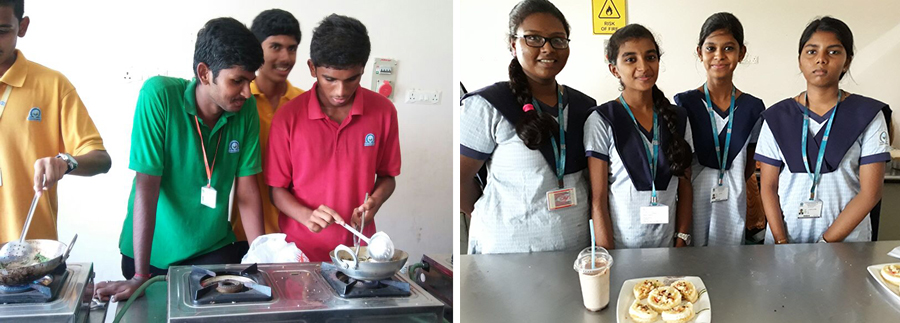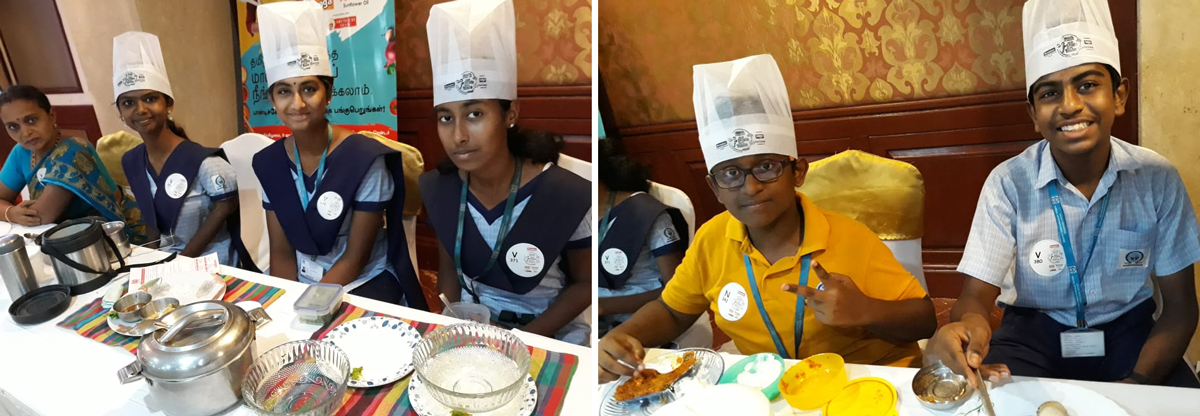The World Health Organization (WHO) defines life skills as: “Life skills are abilities that help us to adapt and behave positively so that we can deal effectively with the challenges of everyday life.”
The ten core Life Skills as laid down by WHO are: Self-awareness, Empathy, Critical thinking, Creative thinking, Decision making, Problem Solving, Effective communication, Interpersonal relationship, Coping with stress and Coping with emotion. Teachers, community agencies and professionals facilitate development of these skills using different methods like class discussions, brainstorming, demonstration and guided practice, role plays, audio and visual activities, arts, music, theatre and dance.
At Omega International School, we emphasize on the development of the following skills for our students:
-
Self Awareness
-
Social Skills
-
Money management and Entrepreneurship
-
Food preparation and health awareness
-
Personal Safety
-
Consumer Education
-
Citizenship
-
Technical (Plumbing, Electrical, Sewing)
-
Household Chores.
The LSA module is seamlessly weaved into a student’s life at Omega as a Co-Curricular program. Specific number of hours of LSA is included in every grade’s day-order.
The Department of Life Skills Activities imparts teaching & development of various life skills to students.
Self-awareness includes recognition of our personality, our strengths and weaknesses, our likes and dislikes. Developing self-awareness can help us recognize stress. It is also often a prerequisite for effective communication and interpersonal relations, as well as for developing empathy for others.
Social skill is any skill that facilitates interaction and communication with others. Social skills help make and sustain friendships, deal with and resolve conflict effectively and fairly, solve problems with others or by themselves, manage strong feelings such as frustration, anger and anxiety, compete fairly and win and lose with dignity and respect for competitors, understand and value the differences and commonalities between people, respecting the right of others to have beliefs and values different from their own. Co-curricular activities like sports and arts are used for improving and developing social skills like communication, interpersonal relationship, emotional management and problem solving.
Children have more money to spend than previous generations and develop spending patterns at a younger age. Those who learn good money management skills are more likely to become adults who can make sound financial decisions, avoid excessive debt, and manage income and expenses to reach their financial goals.
Entrepreneurship is the process of identifying and starting a new business venture, sourcing and organizing the required resources, while taking both the risks and rewards associated with the venture. The most obvious qualities that kids naturally possess that are favorable to entrepreneurship are a natural curiosity, a willingness to take risks, and abundant amounts of energy!
Carnivals are organized periodically to develop entrepreneurial skills of students. These carnivals provide students with the experience of coming up with a brand name, designing a product, attracting customers to boost their sales. Earning money with their effort and efficiency brings a smile to the face of the students, parents, teachers alike. Adding value to it, these earnings are used towards noble cause of supporting education of the underprivileged.
Personal safety today, has become a necessity for every individual. E-safety, electrical safety, food safety, fire safety are some of the important areas emphasised upon at school through various programs. The following questions are addressed with the help of professionals, teachers and Counsellors – What is personal safety? How do we reduce risks to our safety? What can we do to feel safe and be safe? Who can we talk to if we do not feel safe? Where can you get more information about personal safety?
Firefighting programs are a regular feature at the school. Presentations and demonstrations are used for creating practical exposure to students.
A Research by Marty Rossmann, Emeritus Associate Professor of family education, shows that involving children in household tasks at an early age can have a positive impact later in life. By involving in tasks, children acquire a sense of responsibility, competence, self-reliance, and self-worth that stays with them throughout their lives. Activities like wiping down kitchen cupboards, being able to do family laundry completely, handling a pocket knife, sewing simple crafts on a sewing machine (pillows, bean bags, etc.), cleaning and straightening garage, baking biscuits, simple mending and sewing on buttons and washing the car are some of the examples.
Education on Citizenship is about enabling people to make their own decisions and to take responsibility for their own lives and their communities. Democracies need active, informed and responsible citizens; citizens who are willing and able to take responsibility for themselves and their communities and contribute to the political process. School Council of LMOIS provides ample opportunities for developing citizenship skills.
School Events and Celebrations, as well as Competitions are designed according to the life skill chosen for a particular month or to observe days of special importance. These harness skills and abilities that are needed in life as a whole. It prepares one to hurdle the obstacles of life and be the best. It also shapes up the future of the children in a way that will help bring out the best in them.
There is a continuous and conscious effort to identify various school activities where life skills can be developed by creating awareness among all the faculty members and making use of various resources available at school.
Students learn about food - preparation along with its nutritional aspects.

Entrepreneurship

Students learn select technical skills.

Students organize events within school on special occasions.

Students are encouraged to take part in inter-school competitions.

